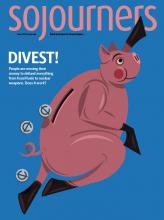WHITE HOUSE Chief of Staff Denis McDonough told an audience this spring that “an occupation that has lasted for almost 50 years must end, and the Palestinian people must have the right to live in and govern themselves in their own sovereign state.”
McDonough decried the illegal construction of settlements in Palestinian territory, under Israeli Prime Minister Benjamin Netanyahu and his predecessors, as intentionally seeking to divide Palestinian communities. He added, “like every administration since President Johnson, we will continue to oppose Israeli settlement activity since it undermines the prospects for peace.”
But many activists refuse to continue to merely decry the occupation, year after year, decade after decade, while facts on the ground worsen and a just peace grows seemingly more elusive. For these activists—and they include many U.S. churches, peace groups, and humanitarian organizations—the time has come to put teeth into efforts to end Israel’s occupation of Palestinian territory and thereby impel progress toward a just peace in the region.
The Presbyterian Church (U.S.A.) has been debating various divestment measures since 2004, and last year the denomination voted to divest from three companies that supply equipment used in the occupation of Palestinian territory.
Read the Full Article
